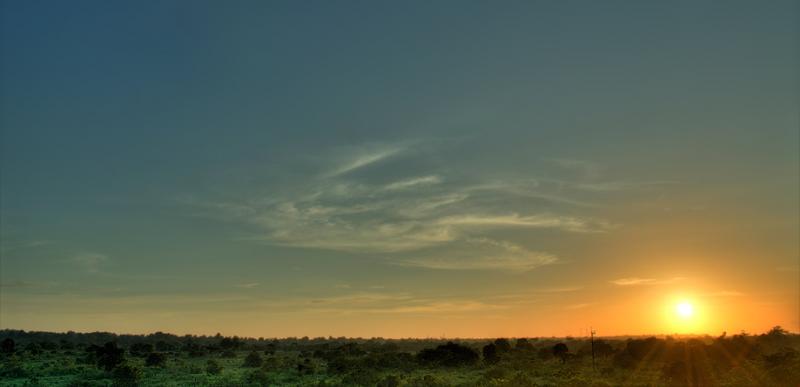
By: Magda Mallen Sierra Urrego (DANE, Colombia), Mónica Rodríguez Zúñiga (Central Bank, Costa Rica), and Daniel Puentes (Vice Minister of Mines and Energy, Paraguay)
(Translated from Spanish; read the original here.)
The countries of Latin America and the Caribbean are keen to implement environmental and economic accounts for energy and air emissions. This information will help in designing national and regional initiatives that support the measurement of sustainability around energy use and the pressures that economic activities place on the environment. Consequently, an "Introductory Course on Energy and Emission Accounts for the Dominican Republic" was held in Santo Domingo from April 3 -7, 2017. The workshop was organized by the Ministry of Environment and Natural Resources and the Central Bank of the Dominican Republic, in conjunction with the Statistics Division of the Economic Commission for Latin America and the Caribbean (ECLAC) and in collaboration with the World Bank’s WAVES program. As part of the Regional Cooperation Program, WAVES and ECLAC sponsored the participation of environmental accounting officers from Paraguay, Colombia and Costa Rica. WAVES later spoke with these participants to better understand some of the key takeaways from the workshop.
What do countries gain from these kinds of knowledge exchanges?
Colombia: Participating in a regional exchange on energy and emissions accounts has been an enriching experience, with peer recognition allowing for improved research, stronger tools, and collaboration to advance economic and environmental statistics for decision-making. Beginning with this workshop, we urge international organizations to replicate these constructive processes, which are an indispensable element of international and regional cooperation efforts, and help to aggregate experiences that contribute significantly to natural capital accounting (NCA) progress.
Costa Rica: Participating in this exchange has helped to create an important knowledge base. The opportunity to work with technical experts from other countries helped to establish formal communication channels for sharing experiences and, eventually, for consultations. In addition, the workshop allowed Costa Rica to publicize the institutional and technical structures associated with the energy flow accounts, as well as to learn best practices and processes used by other countries and experts in implementing these accounts.
Paraguay: We began constructing energy flow accounts in 2016. Participating in this course in the Dominican Republic made it possible to understand and deepen many technical and logistical aspects of this process, providing continuity to our work and clarify certain questions.
Colombia: This introductory course provided a valuable self-evaluation tool for our continuous improvement of accounts. As a result, we will benefit from new procedures for adjusting and validating existing information, giving greater and greater comprehensiveness to the data and any derived indicators. Similarly, learning about the host country's concerns regarding the production of accounts was very informative. We benefited from learning and “unlearning” exercises, the sharing of expectations and concerns, and case studies of strategies for managing and institutionalizing the System of Environmental-Economic Accounts (SEEA).
Costa Rica: The experiences and knowledge shared during the workshop have made it possible to assess, with greater detail, Costa Rica’s current progress in developing energy flow accounts. This course provided motivation to implement changes in search of a better quality data.
Paraguay: Participating in this course was very beneficial since it provided an opportunity to learn from the experiences and practical guidance of countries that have made a lot of progress in this area, as is the case with Colombia and Costa Rica.
Is it necessary to rely on international experts in developing accounts?
Colombia: We needed international support to evaluate the implementation of the SEEA-Energy. This workshop provided an external evaluation of what was being done internally, which was necessary since the implementation of energy flow accounts if very recent, particularly among Latin American countries. Having a course led by an expert helped to better visualize the SEEA-Energy’s applications, concepts and uses.

Costa Rica: The support of international experts has been essential since the beginning of the accounting process. This collaboration has made it possible to understand not only the conceptual principles behind the SEEA-Energy, but also the key partners for building the account. Working with a technical expert allowed us to complete initial exercises related to the energy flow account, which helped us to continue moving forward with production process.
Paraguay: The support of international experts is essential in developing accounts. Building the energy flow accounts requires a comprehensive vision of the links between energy use and environment-economic accounting, based on a set of variables that need to be understood and valued. International experts can provide national-level professionals with the necessary skills to understand these links and the tools to build them.
Concluding thoughts on the results of the workshop:
Colombia: ECLAC’s Regional Cooperation Program is an excellent strategy for transferring knowledge, joining forces, sharing and replicating experiences, and setting up working groups. Together, these efforts undoubtedly help advance the processes of constructing and implementing this type of account.
Costa Rica: The regional component of this activity allows to estimate – to a high level – both the scope and the benefits that derive from supporting and building environmental accounts, in this case energy accounts. Given that Costa Rica’s accounts are relatively recent, participating in these types of workshops is an opportunity to improve analysis based on international expertise.
Paraguay: The course in the Dominican Republic was very beneficial. At the national level, the advantages are not only reflected in a more complete knowledge of the process and the logistics for building energy accounts, but also in an understanding of how accounts can contribute towards identifying the role of the energy sector in issues of sustainable development and the goals of Agenda 2030.
